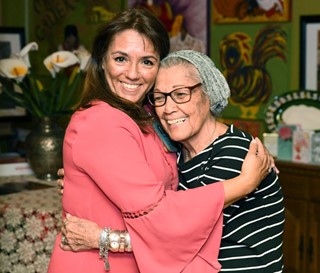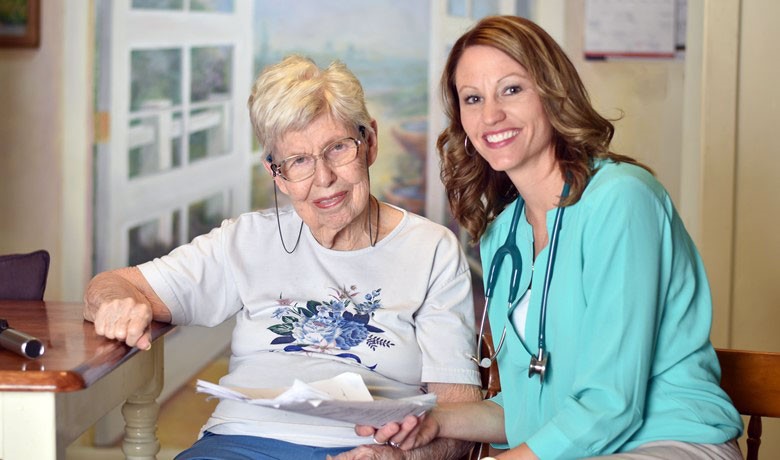HOV’s innovative programs lauded for stellar care

Marcela Vazquez-Bowler (left) is a social worker for Hospice of the Valley’s Arizona Palliative Home Care program, which supports patients like Mary Lou Salazar at home.
Health & Wellness
Fall 2020
by Lin Sue Cooney
George Gardner was “hopeful but skeptical” when he was referred to Arizona Palliative Home Care (AZPHC). But soon, he was blown away by “exceptional service and unbelievably dedicated personnel.” Many AZPHC patients confide that they felt helpless and hopeless — until they found Hospice of the Valley’s palliative care program and experienced the full-spectrum care.
“We got to a point we could not manage by ourselves anymore,” Janet Cochran says. “Then the nurse came out to assess my medical needs, and the social worker helped with the challenges we were having with daily life. We now have a whole team that we can call for answers, anytime. This support is invaluable.”
Patients with serious, chronic or terminal illnesses say AZPHC care teams show “genuine concern” for their well-being, assessing and treating symptoms that are often overlooked by other specialists, such as cancer-related fatigue and chemo-induced nausea.
Mary Lou Salazar says her social worker, Marcela Vazquez-Bowler, has empowered her as a patient — helping her navigate the healthcare system and chart the best course for her. “She listens to me and her support allows me to keep living independently.”
Other patients say they feel less stressed and much safer because their care team comes to them.
Empowering patients is a core goal, explains Dr. Michael Debo, medical director, who describes the AZPHC team as quality-of-life specialists. "We also strive for clear communication between families and medical specialists so we can meet patients where they are and help them figure out how to live their best lives.”
For more information, call 602-212-3000 or visit azphc.org.
A lifeline
Through home and virtual visits, Geriatric Solutions is a lifeline — medically, socially and emotionally — to nearly 1,600 patients who are in no condition to get to a doctor. Instead, the doctor comes to them.

Geriatrics Solutions nurse practitioner Rachel Penning (right) with patient Jean Stewart.
“One of the most beautiful things is how much they appreciate our visits. The human-to-human contact is so important, knowing you may be the only person this patient sees in a month or two,” says Dr. Talissa Adkison, program medical director.
Jean Stewart enjoyed a close rapport with nurse practitioner Rachel Penning and liked how personal it felt to be cared for in the comfort of her own home.
For others, home care is essential. Geriatric Solutions has numerous patients who have not left their residences in years. Due to Parkinson’s disease and advanced dementia, they require the assistance of at least one other person or wheelchair transport to go anywhere.
One patient is a 62-year-old man with a traumatic brain injury who is in a vegetative state. He requires a feeding tube and trach tube to breathe. According to Dr. Adkinson, he would need an ambulance to get to doctor visits, which would cost his wife $1,000 per round trip —not to mention the high risk of complications should he contract COVID-19 in the doctor’s office.
She also has an 83-year-old patient with severe spinal stenosis and diabetes who can barely move. The woman has no support system. “Because of COVID-19, she has not seen another person since March,” Dr. Adkison says. “We are able to do telephone visits with her, but without home-based primary care, she would have no medical care at all.”
For those too frail, ill or at risk due to the current pandemic, Geriatric Solutions may be just what the doctor ordered.
For more information, call 602-954-0444 or visit geriatricsolutions.org.
